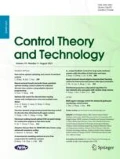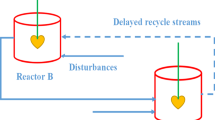Abstract
In this paper, the leader–follower consensus of feedforward nonlinear multi-agent systems is achieved by designing the distributed output feedback controllers with a time-varying gain. The agents dynamics are assumed to be in upper triangular structure and satisfy Lipschitz conditions with an unknown constant multiplied by a time-varying function. A time-varying gain, which increases monotonously and tends to infinity, is proposed to construct a compensator for each follower agent. Based on a directed communication topology, the distributed output feedback controller with a time-varying gain is designed for each follower agent by only using the output information of the follower and its neighbors. It is proved by the Lyapunov theorem that the leader–follower consensus of the multi-agent system is achieved by the proposed consensus protocol. The effectiveness of the proposed time-varying gain method is demonstrated by a circuit system.





Similar content being viewed by others
References
Ren, W., Beard, R. W., & Atkins, E. M. (2007). Information consensus in multivehicle cooperative control. IEEE Control Systems Magazine, 27(2), 71–82.
Liu, W., & Huang, J. (2017). Adaptive leader-following rendezvous and flocking for a class of uncertain second-order nonlinear multi-agent systems. Control Theory and Technology, 15(4), 354–363.
Ding, L., Han, Q.-L., Wang, L. Y., & Sindi, E. (2018). Distributed cooperative optimal control of DC microgrids with communication delays. IEEE Transactions on Industrial Informatics, 14(9), 3924–3935.
Fu, J., Wen, G., Yu, W., & Ding, Z. (2018). Finite-time consensus for second-order multi-agent systems with input saturation. IEEE Transactions on Circuits and Systems II: Express Briefs, 65(11), 1758–1762.
Munz, U., Papachristodoulou, A., & Allgower, F. (2011). Consensus in multi-agent systems with coupling delays and switching topology. IEEE Transactions on Automatic Control, 56(12), 2976–2982.
Dong, Y., & Huang, J. (2013). A leader-following rendezvous problem of double integrator multi-agent systems. Automatica, 49(5), 1386–1391.
Trentelman, H. L., Takaba, K., & Monshizadeh, N. (2013). Robust synchronization of uncertain linear multi-agent systems. IEEE Transactions on Automatic Control, 58(6), 1511–1523.
Zhu, W., Jiang, Z.-P., & Feng, G. (2014). Event-based consensus of multi-agent systems with general linear models. Automatica, 50(2), 552–558.
Xu, X., Liu, L., & Feng, G. (2018). Consensus of discrete-time linear multi-agent systems with communication, input and output delays. IEEE Transactions on Automatic Control, 63(2), 492–497.
Hu, Y., Su, H., & Lam, J. (2013). Adaptive consensus with a virtual leader of multiple agents governed by locally Lipschitz nonlinearity. International Journal of Robust Nonlinear Control, 23(9), 978–990.
Li, Z., Ren, W., Liu, X., & Fu, M. (2011). Consensus of multi-agent systems with general linear and Lipschitz nonlinear dynamics using distributed adaptive protocols. IEEE Transactions on Automatic Control, 58(7), 1786–1791.
Krstic, M., Kanellakopoulos, I., & Kokotovic, P. V. (1995). Nonlinear and adaptive control design. Wiley.
Hua, C.-C., You, X., & Guan, X.-P. (2016). Leader-following consensus for a class of high-order nonlinear multi-agent systems. Automatica, 73, 138–144.
Zhang, X., Liu, L., & Feng, G. (2015). Leader-follower consensus of time-varying nonlinear multi-agent systems. Automatica, 52(2), 8–14.
Li, K., Hua, C.-C., You, X., & Guan, X.-P. (2020). Output feedback-based consensus control for nonlinear time delay multiagent systems. Automatica, 111, 108669.
Chang, L., Zhang, C., Zhang, X., & Chen, X. (2017). Decentralised regulation of nonlinear multi-agent systems with directed network topologies. International Journal of Control, 90(11), 2338–2348.
Li, H., Liu, Q., Feng, G., & Zhang, X. (2021). Leader-follower consensus of nonlinear time-delay multiagent systems: A time-varying gain approach. Automatica, 126, 109444.
Zhu, Q., & Wang, H. (2018). Output feedback stabilization of stochastic feedforward systems with unknown control coefficients and unknown output function. Automatica, 87, 166–175.
Liu, Q., Zhang, X., & Li, H. (2020). Global regulation for feedforward systems with both discrete delays and distributed delays. Automatica, 113, 108753.
Ma, Q., Xu, S., Lewis, F. L., Zhang, B., & Zou, Y. (2016). Cooperative output regulation of singular heterogeneous multiagent systems. IEEE Transactions on Cybernetics, 46(6), 1471–1475.
Xu, X., Liu, L., & Feng, G. (2016). Consensus of single integrator multi-agent systems with directed topology and communication delays. Control Theory and Technology, 14(1), 21–27.
Li, H., Zhang, X., & Liu, S. (2021). An improved dynamic gain method to global regulation of feedforward nonlinear systems. IEEE Transactions on Automatic Control. https://doi.org/10.1109/TAC.2021.3088787
Zhou, B., & Yang, X. (2018). Global stabilization of feedforward nonlinear time-delay systems by bounded controls. Automatica, 88, 21–30.
Li, H., Zhang, X., & Feng, G. (2021). Event-triggered output feedback control of switched nonlinear systems with input saturation. IEEE Transactions on Cybernetics, 51(5), 2319–2326.
Li, H., Liu, Q., & Zhang, X. (2021). On designing event-triggered output feedback tracking controller for feedforward nonlinear systems. IEEE Transactions on Circuits and Systems II: Express Briefs, 68(2), 677–681.
Author information
Authors and Affiliations
Corresponding author
Additional information
This work was supported by the National Natural Science Foundation of China (Nos. 61973189, 62073190), the Research Fund for the Taishan Scholar Project of Shandong Province of China (No. ts20190905), and the Natural Science Foundation of Shandong Province of China (No. ZR2020ZD25).
Rights and permissions
About this article
Cite this article
Li, H., Zhang, X. & Pan, W. Consensus control of feedforward nonlinear multi-agent systems: a time-varying gain method. Control Theory Technol. 20, 46–53 (2022). https://doi.org/10.1007/s11768-022-00083-1
Received:
Revised:
Accepted:
Published:
Issue Date:
DOI: https://doi.org/10.1007/s11768-022-00083-1



